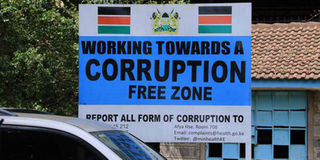The price to pay for treating ethics matters lightly

A signpost at Afya House, the headquarters of the Ministry of Health, in Nairobi. PHOTO | JEFF ANGOTE | NATION MEDIA GROUP
What you need to know:
- Unethical behaviour like bribery and high levels of mistrust among colleagues are key characteristics of today’s workforce.
- Seventy-seven per cent of respondents think that prosecuting individuals will help deter executives from committing fraud, bribery and corruption.
- The quality of ethics and governance at all levels should be seen as the most important factor for the success of the political economy.
The 2017 Ernst and Young Fraud survey report paints a gloomy picture that presents another daunting task in the quest to tackle corruption.
The results of the survey indicate that unethical behaviour like bribery and high levels of mistrust among colleagues are key characteristics of today’s workforce, particularly among executives and also among younger generations.
As ethics and governance practices take centre-stage, there is greater expectation for the private sector to play a more leading role in the debate and implementation of corruption-free economic strategies.
Besides, trust is the cornerstone not only of government but business as well. Without trust, institutions flounder and the need to raise our ethical standards is crucial to rebuild trust.
According to the EY report, 63 per cent of respondents in Africa believe that regulation has a positive impact on ethical behaviour and 73 per cent of respondents would consider providing information to a third-party, such as a regulator or law enforcement agency.
PROSECUTING INDIVIDUALS
Seventy-seven per cent of respondents think that prosecuting individuals will help deter executives from committing fraud, bribery and corruption.
Laudably, the Kenya Private Sector Alliance has championed the enhancement of the regulatory environment, with the recent enactment of an Anti-Bribery Act. The Act’s key objective is to extend the fight against corruption to the private sector by equally criminalising bribery.
Other governing and professional associations are taking heed and signing their members to “Code of Ethics Standards” for doing good business. Additionally, announcing plans to adopt self-regulatory frameworks for their members.
While the power of institutions to make a difference cannot be overlooked, sustaining ethical practices depends first and largely on individual ethics.
SENSE OF SECURITY
Sadly, external factors like regulation give a false sense of security that can lull organisations and their stakeholders into complacency. And, like codes of conduct, they are too often ignored by business executives because of popular discontent with uncertain political and economic environments or plain old financial greed.
Thus, ethical governance cannot be left to written codes or an occasional subject of national debate; an on or off concept. In fact, ethics is a complex, multi-layered concept that demands thoughtful deliberation, continuous dialogue and stakeholder engagement.
For ethics to slowly evolve back into modern day standards of social morals it can’t just be legislated into laws. Conversely, ethics must be instilled using both formal and informal constraints, incentives, values and norms.
The quality of ethics and governance at all levels should increasingly be seen as the most important factor for the success of the political economy.
SOCIAL RESPONSIBILITY
To attain its potential economic value, the business community must uphold an obligation to the highest level of ethics and social responsibility. This commitment is not an option and must be driven by all and especially from leadership and the corporate boards of directors. For ethics to be upheld, it calls for an honest evaluation and key actions to advance or to redeem respect and confidence.
It starts with strategic leadership and direction. Businesses must set a clear mission and value statement that they do business ethically. However, these values must advance into daily conduct and professional standards for all.
Furthermore, it requires a culture of shared norms and beliefs that encourage all stakeholders to uphold these values. It begins with a greater degree of openness, transparency, and honesty, not only at financial audit and reporting but in the way its employees conduct everyday business. It is not possible for a single set of standards or machine logic to cover all and every situation.
REPORTING FRAUD
Hence, a third good practice is putting in place systems for not only identifying and reporting fraud but reinforcing good ethical behaviours.
From hiring practices, training, compensation, evaluation and promotion, systems must reinforce and reward the company values.
As well as a structure that provides adequate governance and monitoring at all levels to ensure competent execution of strategy in a manner that upholds the company’s values. This structure must engage and facilitate open communication with stakeholders and enable effective coordination, alignment of interests and meaningful mutual dialogue.
The writer is the Managing Director Africapractice East Africa Twitter: @ jeffaludo




